This review contains images of stylized blood, gore, and dismembered bodies captured in 8-bit pixel art.
Infernax is a retro adventure platformer where the choices I make determine whether a small kingdom is saved from or corrupted by evil forces that threaten it from within. I play as Alcedor, the young Duke of Upel, who returns home from the Crusades to find his kingdom infiltrated by a nefarious cult. As I guide Alcedor across Upel in search of five castles which act as magical keystones to the cult’s fortress, he is confronted with many binary choices. How I direct Alcedor to act decides whether he stands against the cult, or joins it—maybe even taking it over entirely. Whether I choose a path of righteousness or a path of evil, the journey will be the same, but the tools Alcedor receives to travel that path and which challenging nemesis he faces will change entirely.
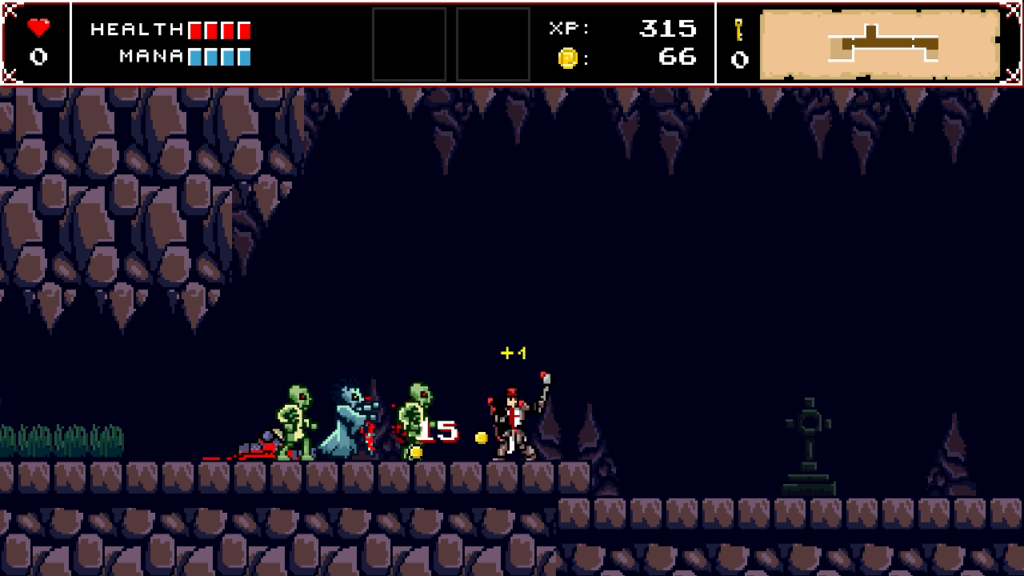
Alcedor begins his adventure as a typical platformer player character. He can move, jump, and crouch. Wielding a mace and shield he brought home from the Crusades, he can fight monsters big and small using careful strikes and methodical blocks to preserve his limited health pool. As he defeats monsters and gains experience levels, I can choose to boost his attack power, health pool, or mana pool. Bottles discovered around the world can be filled with potions that restore health or mana reserves. Spells learned from wise old men boost Aceldor’s defenses, restore his health, or flood the screen with lightning.
The skills Alcedor acquires to traverse the world are more unusual and gradually forge him into a more distinct platforming character. He never learns the traditional double jump. Instead, he learns to hurl his weapon through the air, carrying his body along with it. This physics-defying behavior demands much more precision jumping on my part as I can’t compensate for sloppy mistakes with a second jump. My weapon boosts need to be as precise and considered as my initial jumps.
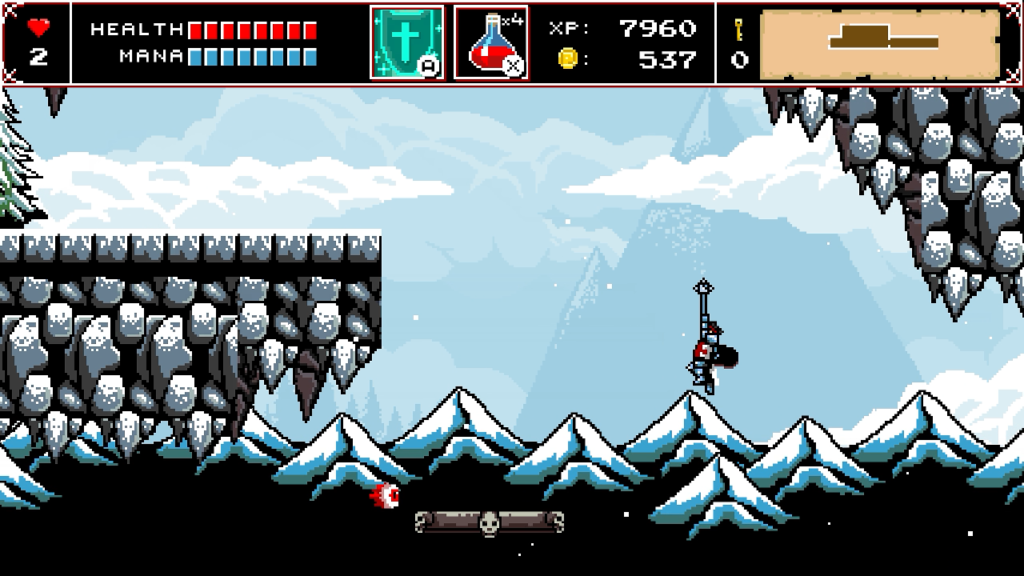
Upel is not a large open world, but it is dense with things to do. Few screens exist only as space between landmarks. Almost every one has some special event or quest which only awaits its trigger to be activated. Most of these triggers are found in Upel’s three towns, where many villagers offer sidequests. In Darsov, a woman at the inn frets about a skeleton defiling her father’s grave. A soldier in Arkos worries about his missing companion, asking Alcedor to find his friend and deliver a healing potion. A Katski man suffers from restless nights because of the monster that prowls his dreams. These sidequests are technically optional, but they provide Alcedor with valuable rewards, unique boss encounters, and act as milestones along his branching paths to the many possible endings.
Some sidequests offer only a single solution, but the rest present Alcedor with a moral decision. The first of these happens almost immediately after starting Infernax. After disembarking the ship that delivers him to Upel, Alcedor encounters one of his subjects twisting with agony and begging to be put out of his misery. If I choose to put him out of his misery, the man dies instantly. If I choose to save him, his body transforms into a misshapen hulk of bone and sinew that engages Alcedor in the first boss battle.
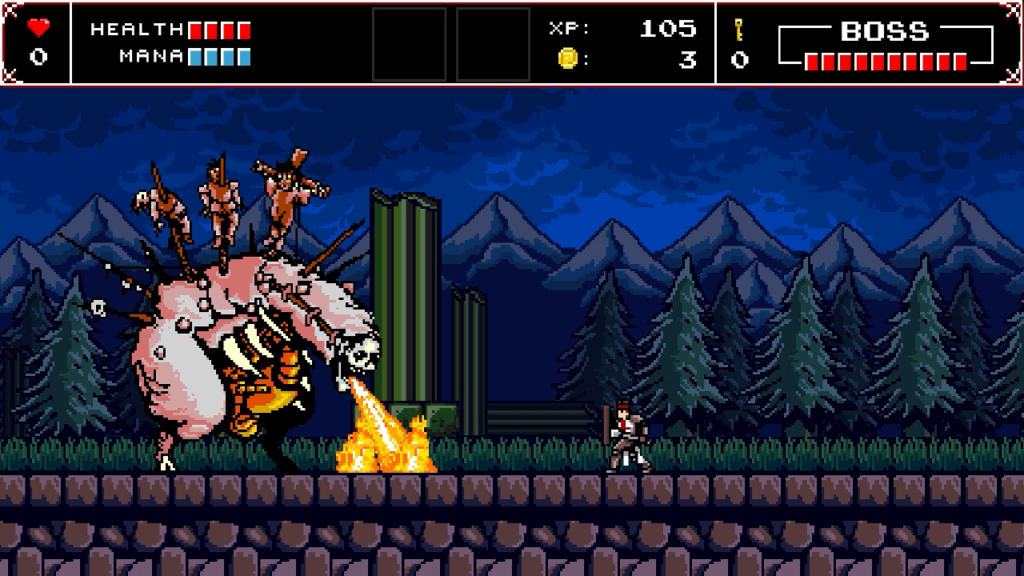
Other choices can have unexpected consequences which do not reveal themselves for many hours. Early in Alcedor’s journey, he encounters some cultists camping outside an old man’s house in the wilderness. I choose to chase them off at the old man’s request. Some time later, they reappear on the bridge to Arkos to get their revenge on Alcedor, and the town’s alchemist is murdered in the ambush. By helping the old man earlier, I unknowingly cut off the ability to replenish Alcedor’s healing potions in a later town.
I appreciate these unknown results because there are otherwise few surprises to Infernax’s moral dilemmas. Making good choices—helping people, killing monsters—turns Alcedor into a good man who saves the kingdom and becomes a just ruler, while making bad choices—destroying villages, sparing monsters—makes him into a bad man who ends up leading the cult he set out to stop. Getting one ending or another doesn’t require navigating a series of nuanced trolley problems. Instead I only have to point to my preference between achingly light and sadistically dark options.
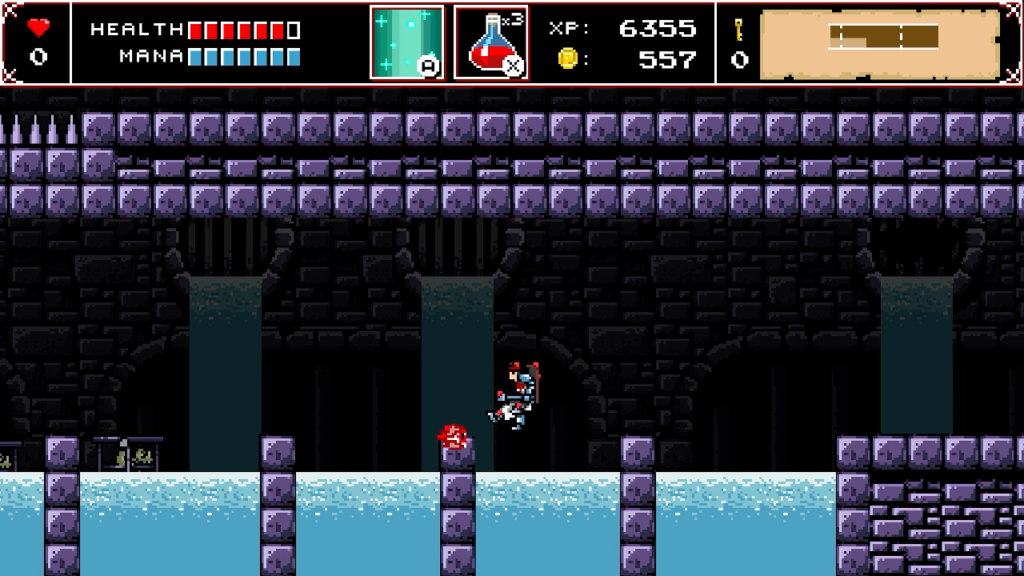
Infernax’s difficulty is like a trough. It starts out challenging, then slides down to easier as I explore Upel and empower Alcedor with level ups and new abilities, then rises back up to challenging again when I tackle the final obstacles leading to the ending.
The early difficulty is a direct result of an unorthodox approach to death. Alcedor begins his quest with no extra lives, which must be purchased from wise men who live in each town. This makes his early limited health pool and lack of healing options a liability, and a misstep into a pit or body of water will send him straight back to the last checkpoint. Dying with an extra life in stock only returns Alcedor to the screen he perished on. Once he’s visited a few towns and has some extra lives banked, it becomes much easier to press into the depths of the cult’s many castles, especially since they are replenished by the next save point he reaches.
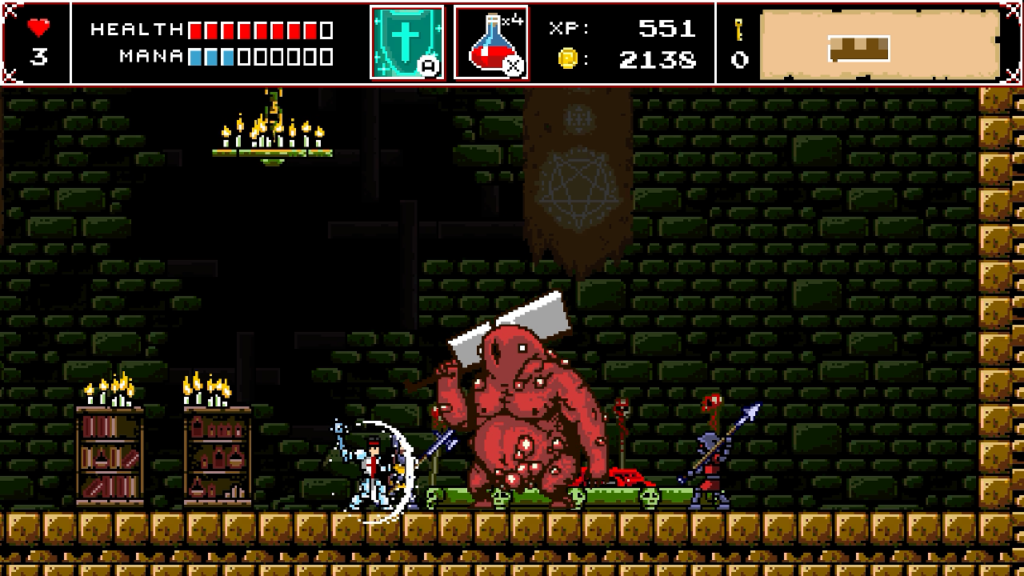
Combat with monsters is the less deadly obstacle Alcedor faces. Again, early on his limited health makes careless mistakes in combat a serious issue. But as I build him up with multiple healing options, combat becomes less and less of a worry. After a few hours it’s viable to beat most bosses by charging them and spamming the attack button. They will fall before Alcedor does.
It’s pits that prove the greatest threat, and most of my deaths were a result of them. Pits don’t care how much health Alcedor has left, how many times he can cast Heal, or how many red potions he carries in his inventory. Pits are an instant death. Flying enemies love to lurk near deadly pits, and they send Alcedor to his doom as many times as an ill-timed boosted jump from his weapon.
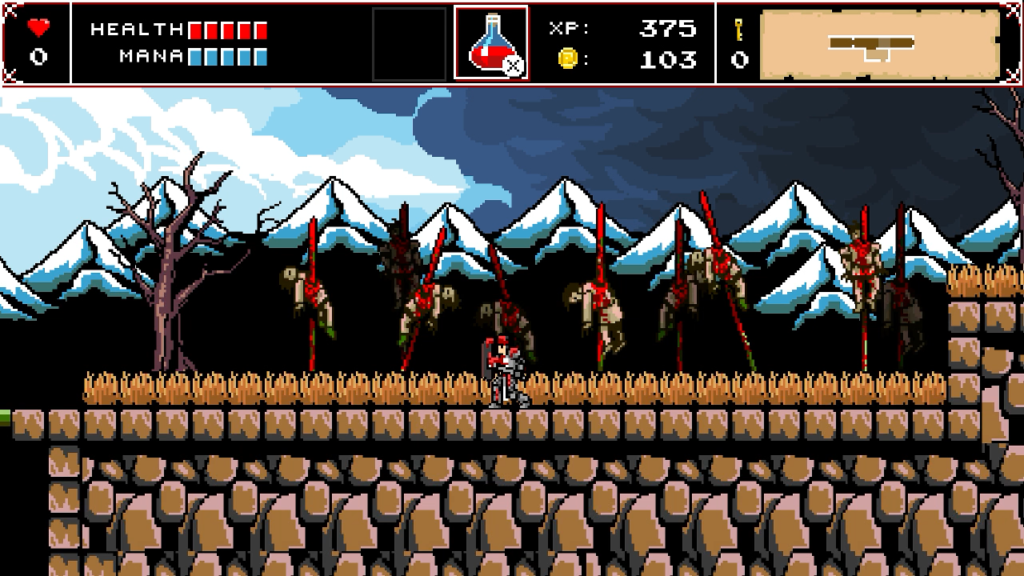
Infernax uses simple sprites and limited color palettes to capture an 8-bit aesthetic that feels authentic to the NES era, but this does not mean it is a friendly videogame. Zombies throughout the world busy themselves feasting on corpses until Alcedor confronts them. The backgrounds of several screens are decorated by human bodies impaled on stakes. Almost every enemy explodes into bloody gibs upon death, one boss in such prodigious amounts that it turns the water beneath its arena red.
At times it can feel like the sheer amount of gore onscreen can become gratuitous, surpassing the utility of showing how evil the cult is into being gruesome just for the sake of it. Yet there’s no denying it gives Infernax a distinct look among the crowded indie platformer genre, and also a step apart from its more innocent 8-bit inspirations. When I make one of Alcedor’s fateful decisions, the graphics become truly spectacular, showing a much higher-detailed image as the person or monster is subjected to my decision. These grotesque images help to make some of the more significant decisions especially memorable.
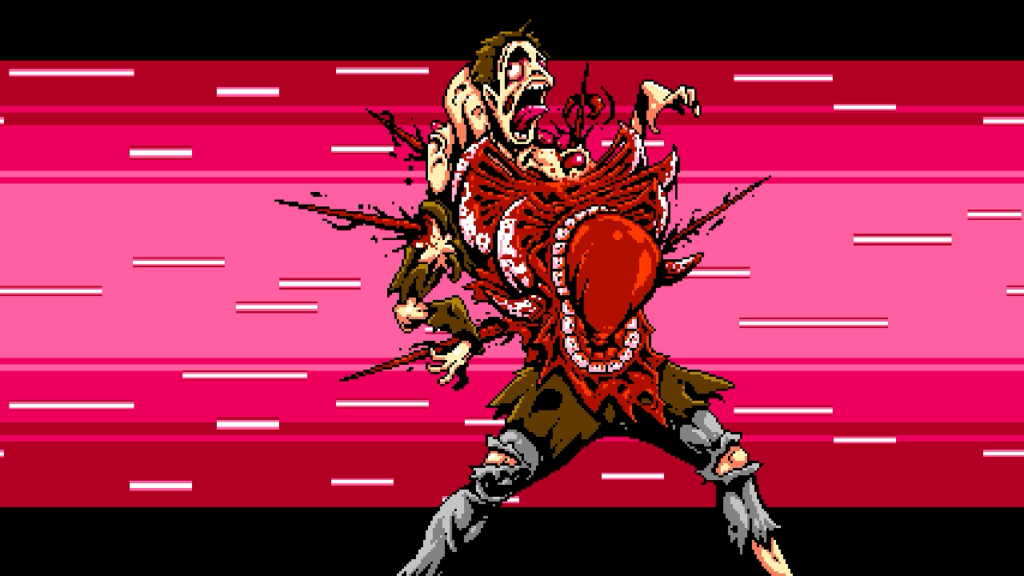
Wrapped up in gory 8-bit-inspired graphics and with level and character design that recalls some of that era’s most infamous and enduring artifacts, Infernax is filled with gore and explorable possibilities. Its biggest misstep might be its difficulty. It’s daunting at the outset when Alcedor has limited healing options, but as he becomes stronger the combat difficulty tapers off until only deadly pits are a threat. Otherwise, it’s great fun. It’s not too long and the world isn’t too large, making multiple playthroughs to see the many outcomes of Alcedor’s choices practical. These choices are presented without nuance, yet they still have surprising consequences that don’t reveal themselves until much later. Despite its ordinary appearance, Infernax hides many surprises.